
In a post-pandemic Africa, the rest of 2022 looks uncertain as financial markets in all areas are beginning to lose some of the momentum from late last year. However, the economic situation in South Africa, the continent’s most economically dynamic nation, could improve between now and the end of the year. Why? There are several factors, some domestic and some international, that play a role in the near-term fate of South Africa’s capital and stock exchanges.
How did the positive changes in 2021 affect South Africa trading and investing enthusiasts, and how might the rest of this year, 2022, pan out? Additionally, what are the primary risks and opportunities that might appear, and how can people do the right kind of research to find the best ways to get involved? Those are just a few of the questions interested consumers should be asking themselves.
Rallies in Africa and South Africa Economies
The 2021 rally in South Africa securities markets was largely a result of COVID rules being eased, businesses resuming operations in full force, and consumers demonstrating pent-up demand for goods and services. Never before in Africa’s history has a global pandemic caused such widespread financial stagnation. But, once governments began to remove lockdown restrictions, there were across-the-board improvements in nearly every sector of African economies, particularly in South Africa’s capital and stock sectors. For the entirety of 2021, South Africa’s major exchange, JSE, saw a 24 percent jump in the total value of listed shares. Individual traders and investors using online brokers like AvaTrade had a good year, despite the continuing COVID effects and a worldwide supply chain crisis.
Artificial Rebound?
It’s possible to look at last year’s South Africa improvements as being almost purely artificial. Why? Because both African and other central banks worked hard to subsidize economic growth in order to keep businesses afloat during the stringent lockdowns. South Africa is a clear example where much of the securities market rise was attributable to factors other than natural improvements. Some of the JSE rise came from European companies listed on the local South Africa exchange. In spite of a domestic economy that was mostly stagnant and in crisis, share prices rose significantly. Now that central bank stimulus in Europe and elsewhere is dying down amid higher prime rates, those positive stock exchange numbers could go south rather quickly.
How 2022 Might Play Out
What’s in store for the balance of 2022? The undeniable fact for capital, stock, and consumer markets is inflation. Rising prices affect everyone, from governments and large institutions all the way down the line to small business owners and individual investors. Throughout the summer months, interested investors should keep their eyes on inflation rates in their home countries as well as internationally. Other factors that have a high probability of impacting the general economic outlook for the year include the Ukraine-Russia war, ongoing logistics problems with supply chains, resurgent pandemic problems in Mainland China, immigration policy changes in Europe, and an upcoming legislature election season in the U.S. All those and more carry the potential to affect the JSE, other African exchanges, and all the major securities markets internationally.
Risks and Opportunities for Traders
Not all bad economic news is a cause for worry, especially for investors and traders who can take advantage of rising and falling markets. For those who buy and sell securities on a regular basis, the goal is to make correct predictions about price movements, regardless of the direction. If inflation continues to take a toll on corporate profits, many who have active brokerage accounts might simply enter into short selling transactions via shares or CFDs (contracts for difference). The advantage of CFDs in such a case is that the trader can get in and out of a transaction without taking an ownership stake and without the need to use borrowed money, or margin. Risks of inflation are most pronounced for savers, who witness a devaluation of their financial assets. It’s important to remember that holders of hard assets, like commodities, precious metals, and real estate have a higher chance of surviving significant inflationary spirals.
How to Research the Markets
Anyone who opens a brokerage account and attempts to play the international or domestic securities and capital markets must do preliminary research. In nearly every case, the best way to learn about specific niches of the marketplace is to utilize brokers’ educational materials. The best brokerage websites offer account holders unique access to tutorials, webinars, articles, classic trading books, and interactive practice tools like simulation trading platforms. It’s essential for buyers and sellers of securities to take advantage of every possible educational resource at their disposal.





